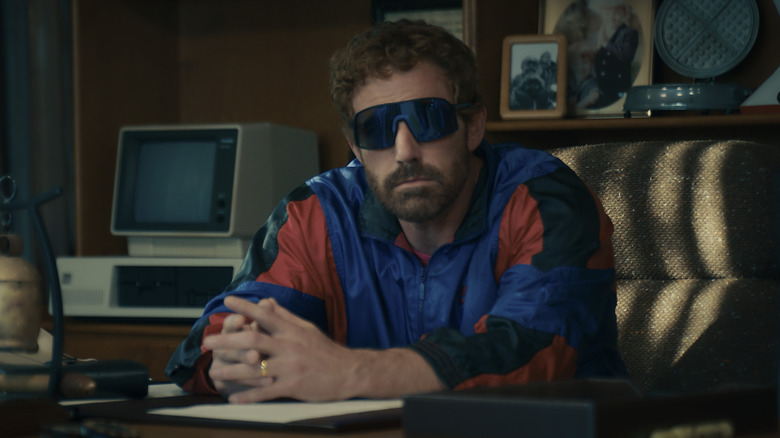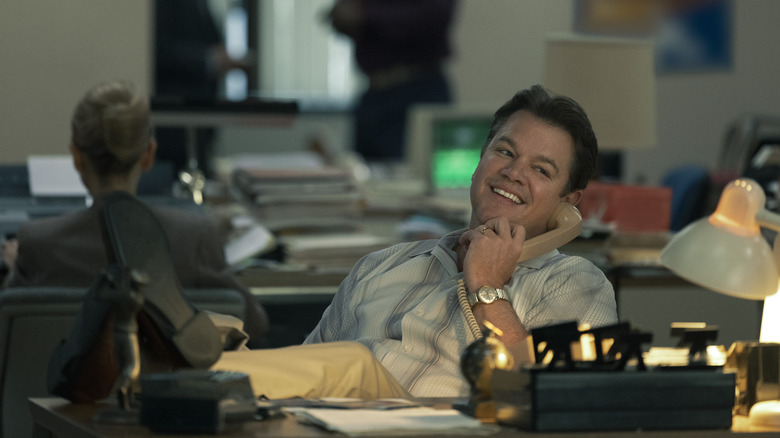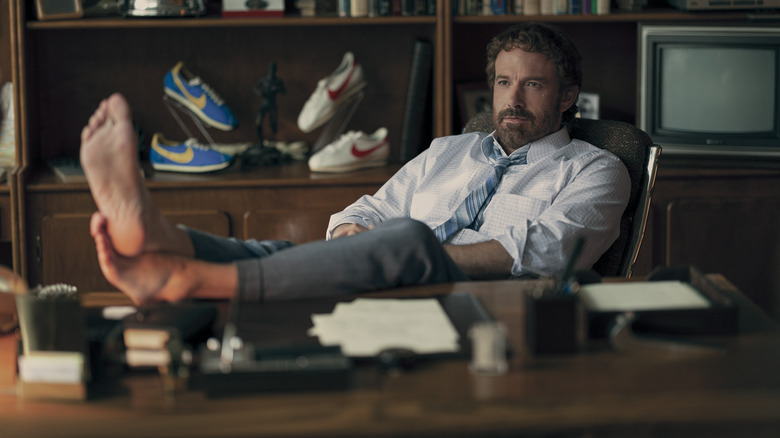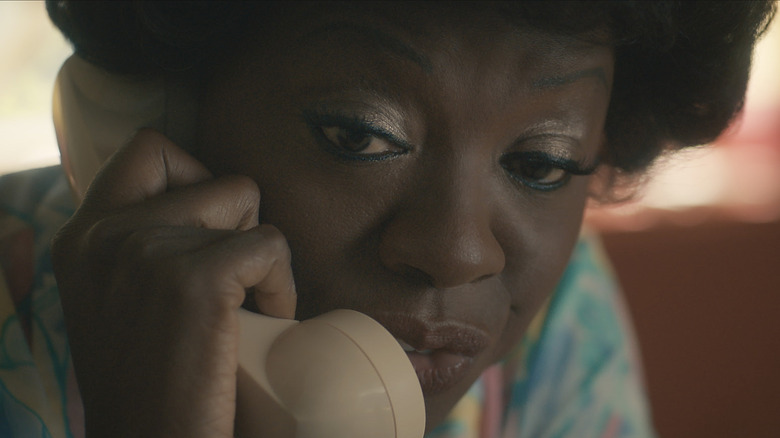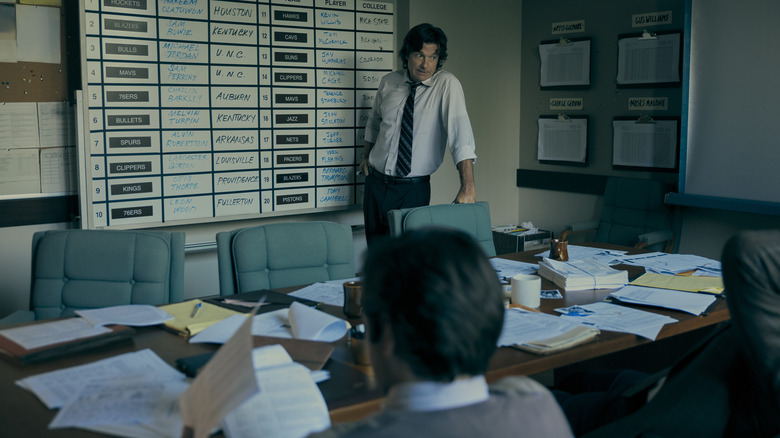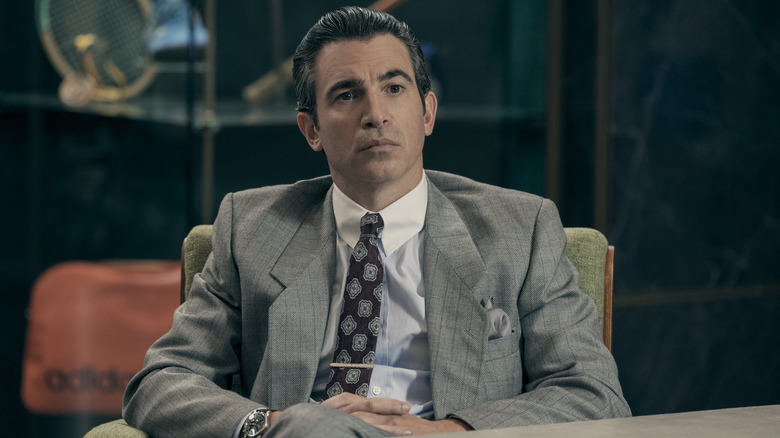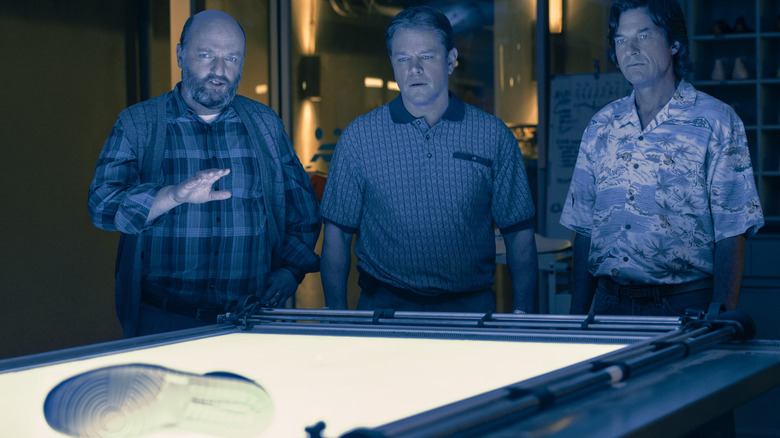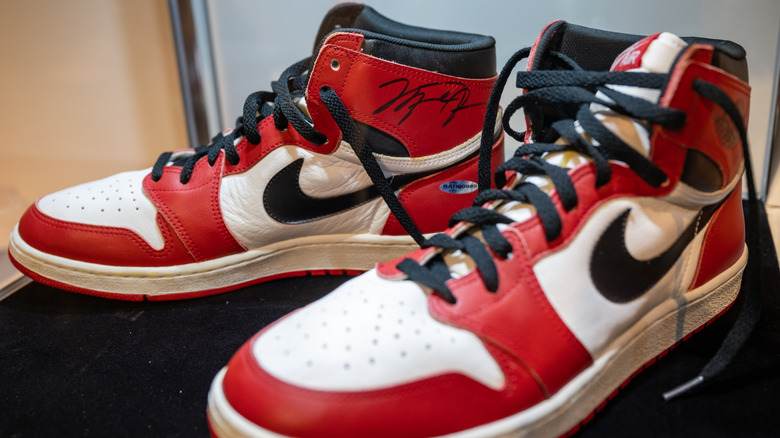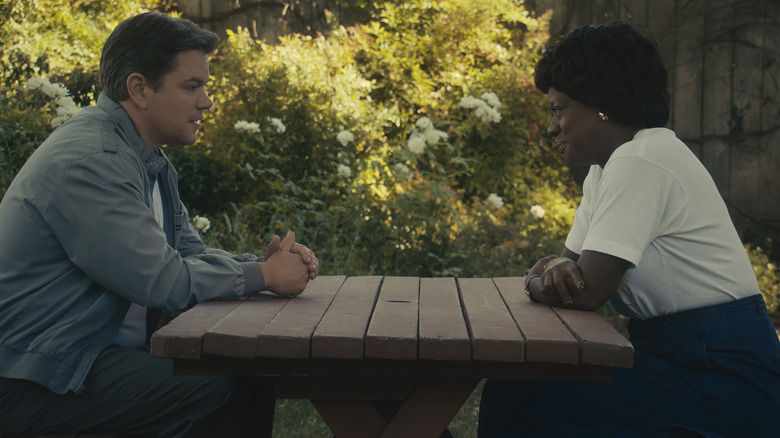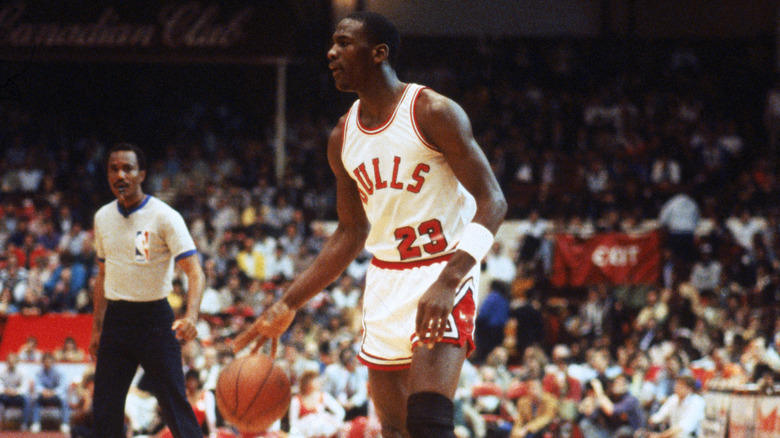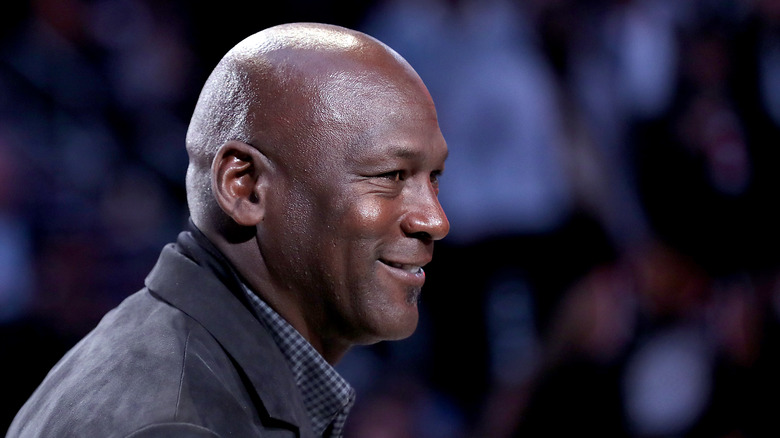The Ending Of Air Explained
Contains spoilers for "Air"
The story of Michael Jordan has been played out in front of our eyes for years in basketball games, news coverage, and documentary films. "Air," the recent film by director Ben Affleck, seeks to explore a new aspect of the Jordan legend without directly retelling Jordan's own story, instead exploring the landmark deal between Jordan and Nike in the 1980s that defined not just Michael Jordan the player, but Michael Jordan the cultural icon, and the business of sports endorsements in general.
Obviously, we know a great deal about how this story played out already, but that doesn't mean the ending of "Air" isn't worth exploring in greater detail, particularly in terms of how the film builds its own character arcs as a piece of fiction, and what its themes say about the subjects it chooses to explore. So, if you've seen "Air," and you're looking for a deeper dive into its characters and narrative, let's have a closer look.
Sonny Vaccaro's big gamble
When we meet Sonny Vaccaro (Matt Damon), Nike's intrepid basketball scout, he is presented as a gambler, a man who uses his knowledge of basketball to win money to pour into yet another gamble. He takes chances, but they are always rooted in his instinctive grasp of the game. In "Air," Sonny's journey is a larger version of this same gambler's attitude, as he uses his sense of the game's larger cultural landscape into one bet: Michael Jordan.
By the end of the film, we know that Sonny's gamble has paid off. He lands the Jordan deal, gets Nike CEO Phil Knight (Ben Affleck) to agree to give the Jordan family a revenue share on every shoe sold, and wins vindication, having advocated for what everyone else at Nike thought was a crazy idea. He saw Jordan as the great player and icon that he would become, even if he could prove it to no one but himself and Jordan's mother Deloris (Viola Davis). This time, though, Sonny doesn't just throw the payoff into the next gamble. Instead, he takes the lessons he learned from the Jordan deal and pours them into advocacy for still more players, eventually becoming a crusader for the rights of college athletes. Sonny has clearly grown, even if he remains a gambler at heart.
Phil Knight's risk
As "Air" begins, Phil Knight is a comfortable, confident CEO who's built Nike into a major player in the sneaker market, even if the company doesn't quite compete with Converse or Adidas. Nike's a running shoe company, Phil is a runner, and these things all sit well with him. They feel like the reliable standard of business at a time when the company is facing losses, which makes him very risk-averse when Sonny suggests betting a huge chunk of his basketball budget on one player.
But as Sonny points out to Phil — more than once — Nike was built on risk and Phil's willingness to make gutsy choices on his way to the top. It's only by remembering that feeling, through the rules he's enshrined on his office wall, that Phil can start to grow and evolve Nike once again. When he focuses on his breathing, then makes the call to allow Jordan to get a revenue share on his signature shoe, it's a sign that he's seen the truth of what the path forward should be. It may seem like a nonchalant decision, but it's actually a paradigm shift for Nike's zen master.
Deloris Jordan's faith
Though Michael Jordan is the focus of every other character in "Air," he doesn't get much screen time at all. Instead, the avatar for the Jordan family is Michael's mother, Deloris, who runs the family from her home in Wilmington and sees Sonny as an earnest dealmaker who could truly do something special for her son. But Deloris Jordan is not just a savvy dealmaker who understands how her son thinks and feels. Through the course of the movie, she proves to be the greatest long-term thinker of any character in "Air."
It's Deloris who advocates not just for Michael to get a lucrative shoe deal (and a new car), but for Michael to work with a company that's going to elevate him to the level she feels he deserves. It's Deloris who tells Sonny, without hyperbole, what Michael can and will do once he makes it to the NBA and starts to deliver on his promise. And it's Deloris who realizes that Michael has the potential to be more than just a famous athlete, and advocates for him through the revenue share idea, a revolutionary concept at the time. Deloris, who went on to run charities in her family's name, saw Michael's rise as something that could lift other Black families alongside her own, and through her advocacy, she made that possible.
Rob Strasser's fulfillment
Rob Strasser (Jason Bateman), Nike's long-suffering basketball marketing executive, spends much of "Air" trying to manage everyone's expectations. He enters the movie intending to pursue multiple middle-of-the-road incoming NBA players, trying to get the most bang out of his division's meager budget. When Sonny comes to him with the idea of pursuing a single athlete, he balks, insisting that it's the kind of decision that could lead to all the Nike basketball employees losing their jobs.
But there's more to this than pride for Rob. As he explains to Sonny, he's a divorced man who only gets to see his daughter once a week, and his ability to give her free shoes and prove his worth as a guy who works at Nike is a cornerstone of that relationship. If he loses his job, he won't just lose income and purpose, but what he perceives as the best way to forge a stronger bond in his fractured family. When the deal works, Rob's trust in Sonny is validated, but so is the strength of his convictions. It's a moment of triumph that hits Rob on several levels, which makes it more powerful.
David Falk's solitude
One of the most fascinating characters in the entire saga of "Air" is David Falk (Chris Messina), Michael Jordan's hardworking agent who plays hardball not just with Sonny and Phil, but with everyone who's courting the young star for a shoe deal. David is ruthless, profane, energetic, and committed to pursuing the highest bidder, all of which serve to make him a thorn in Nike's side, particularly when Sonny tries to go around him and speak directly to Jordan's family. But this attitude is not without self-awareness. Late in the film, David tells Sonny that he knows he doesn't have friends, but he also knows that his way of doing business has made him sought-after and that one day when the fruits of his labor come in, he'll eat alone, then look for friends.
In the film's postscript, we do indeed see David eating alone, but it's not necessarily a sad moment. The way Messina plays it, and the way Falk carries himself, all suggest a man who understands the bargain he made, the life he has led, and where that life was bound to take him. He's at a kind of pragmatic peace, and as he once told Sonny, now he can worry about friends.
Nike's evolution
Early in "Air," as Sonny is pleading with Phil for more resources to devote to the basketball division, Phil begins to expound on why he likes the company the way it is — before the Jordan deal changes everything. They sell running shoes, Phil argues, which are shoes that people wear while they're running, but also while they're doing errands, or going to work, or just hanging around the house. It's a sound business model, and while it's not built on cultural relevance, it is built on serving a very solid need.
When it comes to basketball shoes, Phil estimates the market cap on the product is perhaps a million units, spread across all companies, because he just doesn't see people buying basketball shoes to wear out in the world. Signing Jordan, and building not just one shoe but an entire line around the young star, changes that forever. Adidas were the "cool" shoes when the film began, but with Jordan at Nike, that began to shift, and soon Nike was at the center not just of basketball, but pop culture. The company changed in a matter of years, and it would never be the same again.
The birth of a legend
Though Michael Jordan is a character in "Air," and appears onscreen in certain pivotal scenes, we never see the young star's face, except in archival footage that showcases the real Michael Jordan. According to director Ben Affleck in an interview with the Hollywood Reporter, this was a deliberate choice, because he knew the audience would project their own version of Michael Jordan onto the character, no matter how he was portrayed.
Despite Jordan's relative absence from the story, "Air" is all about Jordan, and the recognition of his legend even from an early age. In the film's pivotal scene, Sonny rewatches a single play from Jordan's college days over and over. He realizes that the play was always designed for the 18-year-old athlete to execute, and despite the pressure, Jordan was poised to win under any circumstances. It's not just proof of talent or even a cool head under pressure. For Sonny — and eventually for Nike — it's proof of his absolute greatness, which would go on to transcend basketball and make him an internationally known figure. By the end of the film, "Air" has made the case, and it's done despite barely showing Michael on screen.
Seeing the future
In the final meeting that helps Nike secure the deal with Michael Jordan, executives set out to show a video that will hopefully dazzle their prospective signee, but Sonny interrupts it. Instead of showing a highlight reel of Jordan himself and how he could work at Nike (set to a cringe-inducingly jaunty tune), Sonny launches into an extended monologue about Jordan as a player, and his future as a star.
As Sonny tells Jordan that he's about to experience the highest highs of any athlete ever, as well as the lowest lows, we see a montage of all of those highs and lows playing out. The film shows us Jordan's NBA heights, his tabloid headlines, the death of his father, and even his short-lived baseball career before his NBA comeback. We see all of that while Sonny talks, laying out not just Michael's potential, but his path as a singular figure in American sports. It's a vital moment in the film, because it underscores that we, the audience, already know Michael Jordan's future. We've known it from the beginning. The film, therefore, is not just about a shoe deal. It's about a consequential moment that took shape at a key point in time, and changed the world in demonstrable ways that we can still see.
The NBA's new era
The National Basketball Association had stars before Michael Jordan, of course. Even as Jordan was beginning his ascent in the league, figures like Magic Johnson, Larry Bird, Isaiah Thomas, and others were key players in the league, and major stars even outside of hardcore basketball fandom. But "Air" points out that, through his early merchandising moves, Jordan had the potential to become a bigger star than any of them, and in the process change the face of the NBA forever.
By building a line centered on Jordan, complete with commercials and even a logo that reflected his high-flying likeness, Nike put a spotlight on an NBA star in ways no other shoe company ever had. Jordan was not just one face of Converse in a sea of all-stars or one player in the big machine of Adidas. Instead, he was the centerpiece of an entire cultural force, which he was able to back up with major achievements on the basketball court. Because of that, the popularity of the NBA rose, but something else also happened. The nature of Jordan's deal — and the revenue stream it created — meant that future superstars could follow in his footsteps, making the NBA a league of players more than a league of teams.
How Jordan changed the movie
Before setting out to make "Air," Ben Affleck reached out to Michael Jordan himself to ask for guidance. It was important to Affleck, he told The Hollywood Reporter, that he make a film that Jordan wouldn't object to, and therefore he wanted the legend's advice on how to proceed. According to Affleck, Jordan gave him a few pieces of advice.
For one thing, Jordan emphasized the importance of athlete relations representative Howard White (Chris Tucker) in making the deal at Nike, giving Tucker more leeway to experiment with the character's prominence in the film. But most importantly, Jordan emphasized just how crucial his mother was in the process, and even requested that Viola Davis be the one to play her.
At the time, Deloris was not a major player in the script, which left Affleck with an important decision. The director decided to reframe the narrative, making "Air" much more about the Jordan family and Deloris in particular, securing Davis for the role as Jordan requested. It was a decision that changed the entire shape of the narrative, particularly the ending, as Deloris becomes the one who advocates for her son's unprecedented deal. Without that input from Jordan, "Air" would not have been the same.
